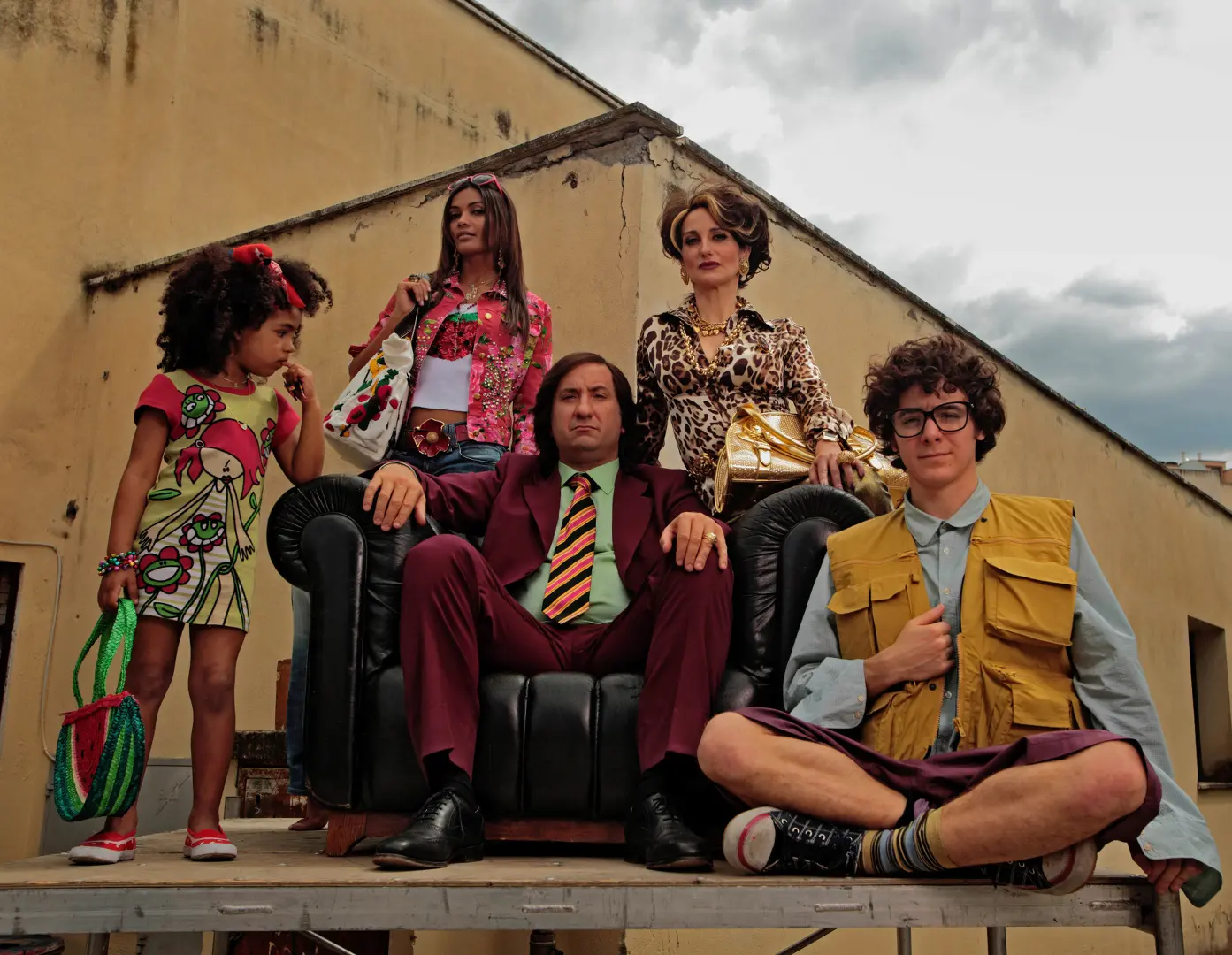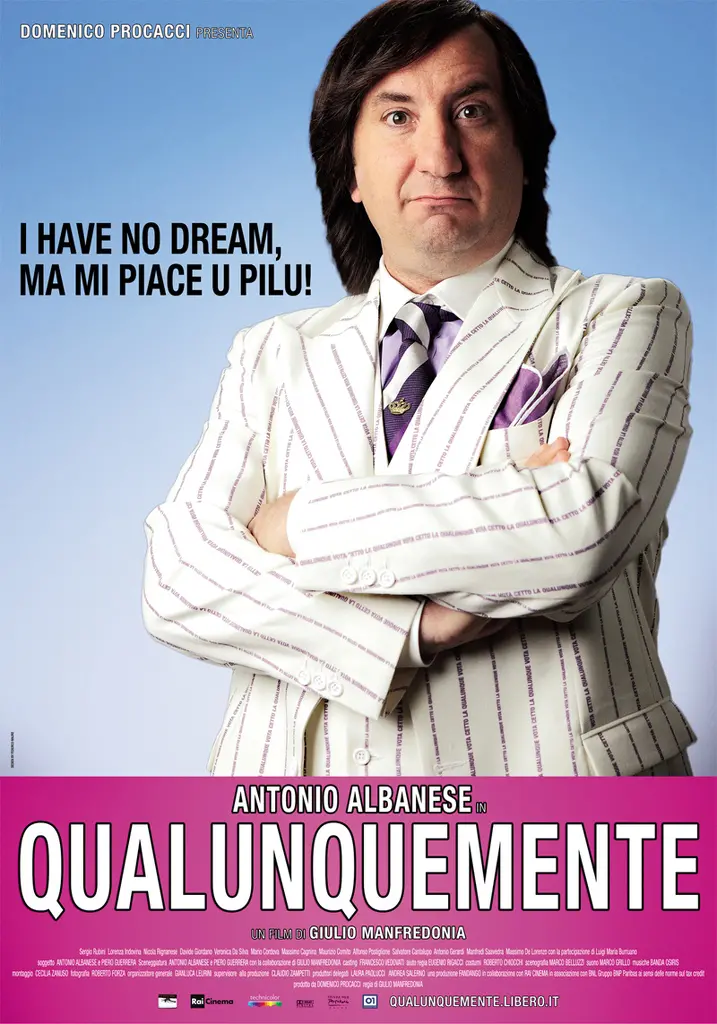

The film is set in Calabria and was filmed in various municipalities around Rome and Rieti, as well as in Calabria itself. The place where the unconventional electoral campaign takes place is the fictional town of Marina di Sopra, which we are introduced to in the opening sequences of the film, when a rusty road sign riddled with bullet holes reveals its unlikely twinning with Weimar.
After four years on the run in South America, Cetto arrives in the town by car accompanied by one of his lackeys, after landing at Lamezia Terme (CZ) airport, winding his way around the hairpin turns in the area. On one of these, Cetto stops to relieve himself, and in throwing away his cigarette, neglectfully starts a forest fire: the road in question is located near Fara in Sabina (RI) and is the same one on which, a few scenes later, an old woman who refuses to vote for Cetto is ‘abandoned’ during an electoral propaganda tour. The old people on the tour are taken from a retirement home, the exteriors of which are those of an old psychiatric hospital in piazza Santa Maria della Pietà in Rome.
There comes a point in the electoral campaign when Cetto allows himself to be talked into recruiting an expert to help him to win the election: Gerry Salerno stays at the ‘Castellozzo Miramare’ hotel, the name of which comes from where it is actually located, or rather the ‘Castello Miramare’ beach resort in Maccarese, near Fiumicino (RM).
Also near Rome, in an open space at Villa Adriana, in the district of Tivoli (RM), filming for the political assemblies took place; not far away is the local hangout of Cetto and his cronies.
Scandeluzza Castle in Rome (which is actually a hotel) lends its exteriors to the villa owned by Cetto and his family. The exterior shots of the prison, which Cetto has his son locked up in to pay for his mistakes, are also those of a real institute for young offenders in Rome.
The photography intensifies the desolate appearance of the area, built up beyond belief and dominated by environmental monstrosities, as shown in the final scene in which Cetto declares that he wants to build pilu bridge, and does so through an illegal construction site, which would have been closed down if it weren’t for him and which he uses to give work to a large part of his electorate. We’re in Santa Trada in Villa San Giovanni (RC), right under the pylon of the decommissioned Elettrodotto dello Stretto power line, which looks to its Sicilian counterpart just a few kilometres away across the sea.
The film is set in Calabria and was filmed in various municipalities around Rome and Rieti, as well as in Calabria itself. The place where the unconventional electoral campaign takes place is the fictional town of Marina di Sopra, which we are introduced to in the opening sequences of the film, when a rusty road sign riddled with bullet holes reveals its unlikely twinning with Weimar.
After four years on the run in South America, Cetto arrives in the town by car accompanied by one of his lackeys, after landing at Lamezia Terme (CZ) airport, winding his way around the hairpin turns in the area. On one of these, Cetto stops to relieve himself, and in throwing away his cigarette, neglectfully starts a forest fire: the road in question is located near Fara in Sabina (RI) and is the same one on which, a few scenes later, an old woman who refuses to vote for Cetto is ‘abandoned’ during an electoral propaganda tour. The old people on the tour are taken from a retirement home, the exteriors of which are those of an old psychiatric hospital in piazza Santa Maria della Pietà in Rome.
There comes a point in the electoral campaign when Cetto allows himself to be talked into recruiting an expert to help him to win the election: Gerry Salerno stays at the ‘Castellozzo Miramare’ hotel, the name of which comes from where it is actually located, or rather the ‘Castello Miramare’ beach resort in Maccarese, near Fiumicino (RM).
Also near Rome, in an open space at Villa Adriana, in the district of Tivoli (RM), filming for the political assemblies took place; not far away is the local hangout of Cetto and his cronies.
Scandeluzza Castle in Rome (which is actually a hotel) lends its exteriors to the villa owned by Cetto and his family. The exterior shots of the prison, which Cetto has his son locked up in to pay for his mistakes, are also those of a real institute for young offenders in Rome.
The photography intensifies the desolate appearance of the area, built up beyond belief and dominated by environmental monstrosities, as shown in the final scene in which Cetto declares that he wants to build pilu bridge, and does so through an illegal construction site, which would have been closed down if it weren’t for him and which he uses to give work to a large part of his electorate. We’re in Santa Trada in Villa San Giovanni (RC), right under the pylon of the decommissioned Elettrodotto dello Stretto power line, which looks to its Sicilian counterpart just a few kilometres away across the sea.

Cetto La Qualunque stands in the local elections of Marina di Sopra in Calabria: he pulls out his entire arsenal of dishonesty, corruption and boorish propaganda to win the elections and banish the spectre of legality from the town.